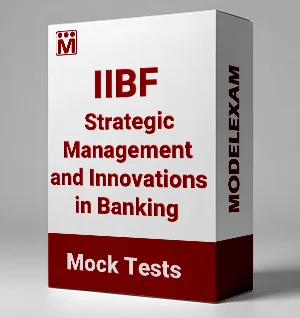Certificate Examination in Strategic Management & Innovations in Banking - Exam Pattern, Syllabus, Eligibility & Fees
Strategic Management & Innovations in Banking

Comprehensive practice tests based on the latest IIBF syllabus.
OBJECTIVE
The course on “Strategic Management & Innovations in Banking” is expected to provide the cutting-edge knowledge on the subject to the functionaries working at various positions.
ELIGIBILITY
- Members and Non-Members of the Institute.
- Candidates must have passed the 12th standard examination in any discipline or its equivalent.
EXAM DETAILS
- Question Paper will contain 100 objective type multiple choice questions for 100 marks.
- The examination will be held in the remote proctored mode only.
- There will NOT be negative marking for wrong answers.
- Duration: 2 hours.
- Language: English only.
PASSING CRITERIA & FEES
- Minimum pass marks: 50 out of 100.
- Member Fee: Rs 1100 (+ taxes).
- Non-Member Fee: Rs 1600 (+ taxes).
MULTIPLE CHOICE QUESTIONS (MCQS) AND ANSWERS
SYLLABUS
Module A: Strategic Management: General Concept and Process
Unit 1: Strategy and Strategic Leadership in Dynamic Times
Introducing Strategic Management, Leading Strategically through Effective Vision and Mission
Unit 2: The Internal and External Environment of Strategy
Examining the Internal Environment: Resources, Capabilities, and Activities, Exploring the External Environment: Macro Industry Dynamics.
Unit 3: Business, Corporate, and Global Strategies
Creating Business Strategies, Crafting Business Strategy for Dynamic Contexts, Developing Corporate Strategy, Looking at International Strategies.
Unit 4: Strategy Vehicles for New Directions
Competitive Dynamics, Growth including organic growth, Diversification, Mergers, Acquisitions, Joint Ventures, Strategic Alliances, Internationalization including International Banking Business (in brief).
Unit 5: Strategic Thinking (in general and its application in banking)
Meaning, Foundation of Strategy, Strategic Intelligence including Strategy Analytics, Appreciation of Conflicts including Resources, Contests, and Cooperation and Implementation.
Module B: Strategic Management: Functional Application – General and Banking
Unit 1: Finance and Banking:
Strategic Finance Management including international financial management, Strategic Asset Management including Product design and performance, comparative strategies in Private banking, Corporate banking, investment banking, Universal banking, specialised banking like small finance banks, payment banks, deposits, banks performance, bank capital, Strategic risk analysis and Restructuring.
Unit 2: Cost, Credit and Banking:
Strategic Cost Management, Strategic Credit Management, Strategic ALM including value and profit.
Unit 3: Business, Corporate, and Global Strategies
Strategic marketing including international scenario, International strategic marketing, Blue Ocean strategy, Red Ocean strategy, Customer analytics.
Unit 4: HR and Banking:
Strategic HRM, competency, International SHRM, Knowledge management.
Unit 5: Business Development and Banking:
Strategic Business development, value to customers, changing customer expectations, redesigning customer experience models, new business development.
Module C: Corporate Governance in Banks
Unit 1: Introduction to Corporate Governance
Corporate Governance developments in brief, International Corporate governance.
Unit 2: Issues:
Values, Leadership (including Leadership 4.0), Culture, Ethics.
Unit 3: Governance in Indian Banks:
Public sector Bank, Private sector Bank, Issues, Challenges, Global scenario, NPAs.
Unit 4: Governance in Regulations:
Basel II, III, IV, SEBI LODR, Companies Act, other global scenario.
Unit 5: Governance structure:
Public, Private, Small Banks, Payment Banks (developing a structure).
Module D: Innovation and Strategic Challenges in Banking
Unit 1: Innovation and Technology factor:
Innovation, Strategic Management of Innovation and challenges, Strategy by design process, Management of Technological innovation and challenges.
Unit 2: Digital factor:
Digitalisation, payment system, strategic digital banking and capabilities applied and required along the stages of the customer journey, big data, social media.
Unit 3: Issues and development factor:
Financial Innovation in Retail banking and Corporate Banking.
Unit 4: Reinventing business model in business.
The need and necessity of reinventing the business, role of banks in the future financial services value chain.
Unit 5: Sustainability, effects and measures:
Through an index score (including social, environment and economic and developing the index), Corporate Social responsibility in Banks.